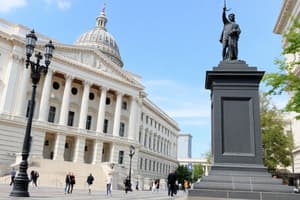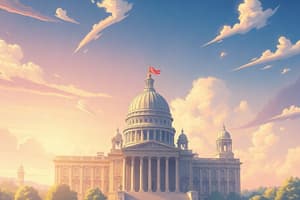Podcast
Questions and Answers
What is the first stage of the policy process?
What is the first stage of the policy process?
- Policy evaluation
- Policy formulation
- Agenda setting (correct)
- Policy implementation
Which of the following is NOT one of the ways identified by agenda-setting scholars for items to reach the government's agenda?
Which of the following is NOT one of the ways identified by agenda-setting scholars for items to reach the government's agenda?
- Based on the government's own priorities and goals (correct)
- Through objective indicators like unemployment rate
- By societal learning about problems
- Influenced by powerful interest groups
What is the purpose of the agenda setting stage?
What is the purpose of the agenda setting stage?
- To determine how problems gain the government's attention (correct)
- To decide whether to maintain, replace or terminate a policy
- To identify potential solutions to a problem
- To assess the success of a policy
Which stage follows after agenda setting in the policy process?
Which stage follows after agenda setting in the policy process?
What makes policy evaluation the most contentious stage?
What makes policy evaluation the most contentious stage?
When can a policy be terminated, according to the text?
When can a policy be terminated, according to the text?
What is the primary focus of agenda setting in the policy making process?
What is the primary focus of agenda setting in the policy making process?
Which of the following is NOT a key factor influencing agenda setting?
Which of the following is NOT a key factor influencing agenda setting?
What is the role of political activism in agenda setting?
What is the role of political activism in agenda setting?
Which of the following best describes the role of political communication in agenda setting?
Which of the following best describes the role of political communication in agenda setting?
Which of the following statements about agenda setting is FALSE?
Which of the following statements about agenda setting is FALSE?
What is the primary goal of political activism in the context of agenda setting?
What is the primary goal of political activism in the context of agenda setting?
What is the main focus of the policy formulation stage?
What is the main focus of the policy formulation stage?
What is the role of legislators in the decision-making stage?
What is the role of legislators in the decision-making stage?
Which stage of the policy process is described as the most crucial?
Which stage of the policy process is described as the most crucial?
According to the research mentioned in the text, what is the relationship between good governance and economic growth?
According to the research mentioned in the text, what is the relationship between good governance and economic growth?
Which aspect(s) of governance are found to be positively correlated with economic growth, according to the research mentioned?
Which aspect(s) of governance are found to be positively correlated with economic growth, according to the research mentioned?
In which context does the text suggest that economic growth may drive improvements in governance?
In which context does the text suggest that economic growth may drive improvements in governance?
Study Notes
Political Culture
- Parochial Political Culture: People have little to no knowledge of political input but are aware of the output, examples include major Asian countries and a few African countries.
- Participant Political Culture: Found in developed countries where people are knowledgeable about both input and output, examples include the USA, France, and European countries.
Political Concepts
- Political Activism: The process of campaigning or working for an organization to bring about political or social change.
- Political Communication: An interactive process concerning the transmission of information among politicians, the news media, and the public.
Policy Making Process
- Public Policy: According to various definitions, it refers to a set of decisions taken by a political actor or group of actors concerning the selection of goals and the means of achieving them.
- Five Stages of Policy Making Process:
- Agenda Setting: Identifying problems and getting them on the government's attention, can be done through objective indicators or other means.
- Policy Formulation: Setting objectives, choosing courses of action, and selecting tools to address the problem.
- Decision-Making: Legitimizing formulated policies, often a satisficing process depending on institutional constraints and political calculations.
- Implementation: Translating policy intentions into action, the most crucial stage.
- Policy Evaluation: Assessing the extent to which a policy was successful, the most contentious stage.
Good Governance and Economic Growth
- A positive relationship exists between good governance and economic growth, according to some researchers, while others argue that economic growth may drive improvements in governance.
Studying That Suits You
Use AI to generate personalized quizzes and flashcards to suit your learning preferences.
Description
Explore the concept of policy evaluation in public administration, focusing on assessing the success of policies and making decisions to maintain, replace, or terminate them. Learn about the challenges and considerations involved in evaluating policies.




